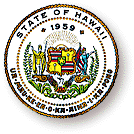DOE to lower
test standards 20%
|
Public-school students will face a drop in the number of standards in which they must show proficiency, a move that could lead to better scores in one of the toughest state tests in the nation.
 Schools Superintendent Pat Hamamoto stressed that the intent is not to lessen rigor, but to boil down the standards, which are key concepts students are expected to know at their grade level. School authorities are looking at sticking to the essentials by eliminating overlap and other inefficiencies.
Schools Superintendent Pat Hamamoto stressed that the intent is not to lessen rigor, but to boil down the standards, which are key concepts students are expected to know at their grade level. School authorities are looking at sticking to the essentials by eliminating overlap and other inefficiencies.
Anything that might make preparing for the Hawaii State Assessment easier is likely to be welcomed by teachers and students at schools that struggle to get ready each year for a test considered among the toughest in the nation.
The revised standards will require a new test to be written. That test might also feature adjustments that, for example, test a student on defining some concepts while not asking the student to manipulate them, as they might with some grammatical or mathematical problems.
The net effect would be a roughly 20 percent reduction in overall standards on which students must display proficiency, she said.
State standards are tweaked every few years to ensure an efficient, properly sequenced set of knowledge throughout the grade levels.
Hamamoto said the 4-year-old Hawaii State Assessment is aiding that effort because it is now beginning to provide enough data to allow substantive analysis of the standards.
"We're not talking about lowering standards, but about refining the proficiency for all grades based on the data we now have," she said.
Questions that have repeatedly given students problems also will be looked at.
"We can now look at items that have been continually scored wrong, and take a look at whether they were constructed properly," Hamamoto said.
Last week, the results of this year's test showed improvement in some areas, while some grade levels flat-lined or backtracked from the year before.
The results, particularly when compared with SAT scores in which Hawaii students typically perform well compared with the rest of the nation, prompted some Board of Education members to ask whether the standards and the test deserve a second look.
"We have re-looked at ourselves in the past," said board member Karen Knudsen.
An independent study rated the Hawaii State Assessment as one of the most rigorous state tests in the nation.
The state set its bar high years ago, before the Bush administration's No Child Left Behind law was enacted in 2001. The law specifies an escalating series of sanctions for schools that fail to meet state-set performance levels but provides no matching funds.
The pressure on schools to avoid sanctions is heavy, worrying some parents.
Jo Ann Picanco's son was in the third grade last year at Benjamin Parker Elementary School, one of the grades that now takes the Hawaii State Assessment. As such, it was the target of an intense preparation effort.
"In the second grade, my son had confidence and self-esteem. He tried really hard and would actually tell me, 'I've got to finish my homework,'" she said.
"But in the third grade, he lost his self-esteem and started saying, 'I'm no good at this.' It's just overkill."
A number of states have gone back to the drawing board amid No Child Left Behind's pressure by refining their standards or lowering the bar outright, said Mary Fulton, an education policy analyst with the nonpartisan Education Commission of the States.
www.hawaii.gov
E-mail to City Desk
[News] [Business] [Features] [Sports] [Editorial] [Do It Electric!]
[Classified Ads] [Search] [Subscribe] [Info] [Letter to Editor]
[Feedback]
